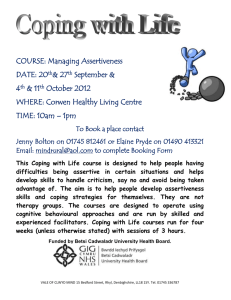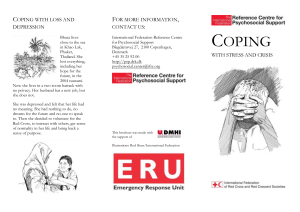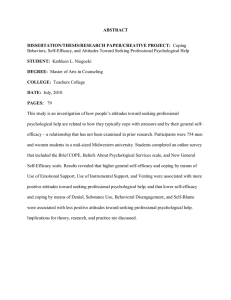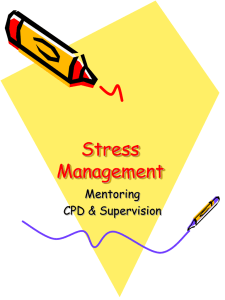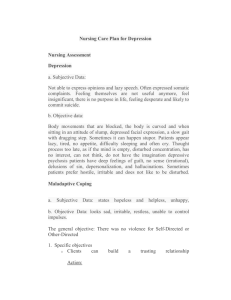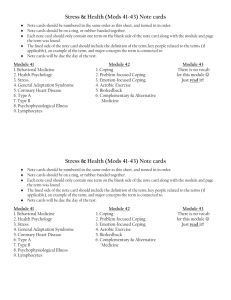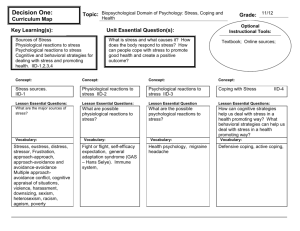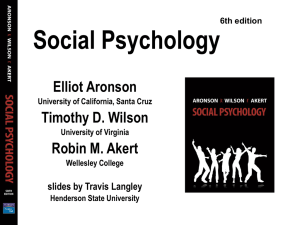Self-efficacy: The exercise of control
advertisement
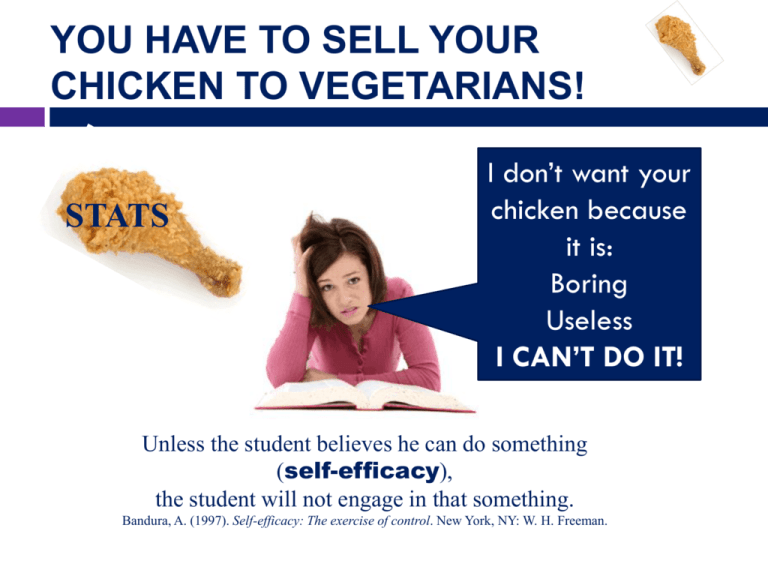
YOU HAVE TO SELL YOUR CHICKEN TO VEGETARIANS! STATS I don’t want your chicken because it is: Boring Useless I CAN’T DO IT! Unless the student believes he can do something (self-efficacy), the student will not engage in that something. Bandura, A. (1997). Self-efficacy: The exercise of control. New York, NY: W. H. Freeman. SELL YOUR CHICKEN! HOW TO GET STUDENTS MOTIVATED TO LEARN M.E. McWilliams, AARC 2012 •I too didn’t understand the lecture! •I too felt stupid! •I too felt hopeless! Yep, even me! EVERYONE struggles with at least some class. 1980 YOUR BRAIN CAN LEARN THIS STUFF! YOU MIGHT NOT MAKE AN A—OR EVEN A B—BUT YOU CAN GET THE JOB DONE! I was once you! SELF-EFFICACY MATTERS! A random experiment is any repeatable process which must result in exactly one outcome of a well-defined set of observable outcomes, none of which can be predicted with certainty. I failed the first test. I get the message: I am a loser. I was not born to do math. If I don’t have what it takes, why am I even coming for tutoring? Poof! THE METHOD 1. COPING MODEL If I can do this stuff, you can too! 2. DEMONSTRATION OF SUCCESS See, You ARE doing it! COPING MODEL: YA YA! I used to think I was not good at math at all. Why? First, I always got Fs on my tests (40-68) for several years. the worst test grade I ever made was 5! However, I am a good student, I went to class every day, and I did my homework every night. My teacher always wanted me to stay in the school during lunch (I was so hungry!). All the effort I made didn’t count at first when it came to tests. The only thing did right is keep consistent and do my best. I thought somehow all my effort would pay off sooner or later. And it did. Now, I am a math tutor. I tell my students that to make a good grade they need to keep consistent, practice, and do their best. COPING MODEL: KIMBERLY! In my freshmen year, I took MTH 139. I went in thinking I was really good at math and I didn't need to study. Needless to say I was wrong. I ended up making a C on the first test. So I started going to my SI (Austin Clark was my SI Leader) and I went to my professor’s office. I ended up pulling an A out of the class—just barely—but it was an A. COPING MODEL: CHRISTEN! In my senior year of completing my math degree, I was misadvised and found out a week before classes started that I was short 5 hours to graduate. I was DEVASTATED. Instead of pushing back my graduation, I just added the 5 hours to my course load making it 20 hours each semester with 3 advanced math classes each semester and an advanced chem class on top of working parttime, planning my wedding, and getting married. It was a struggle! But I graduated in 3 years with honors. Ever since then, no matter what life has thrown at me I've known that I'll get through it because I've been superwoman before and I can always throw my cape on again! COPING MODEL: PAIGE! In my second semester I had an 8 am Business Communications class. I got up and went to class, read, and did what I was supposed to. When it came time to take the test, I thought I did great! When I got the score back however... I had failed! So I worked harder and read more. Next test? Failed that one too! After not failing anything in my life, I was so stressed thinking there was no way I could do good in this class. So I talked to the professor and told her ALL of this and more. She worked with me and calculated my possible grades. Knowing she was on my side, made me more confident. I did GREAT for the rest of the semester, and got an A in that class!! Moral of the story? ALWAYS TALK WITH YOUR PROFFESSORS! COPING MODEL: DAMON! When I was a freshmen, I struggled to get the online homework for a class. For the life of me I could not get it to work. I would have the correct answer, but it wasn't the way that the software wanted the answer to be written. After failing the first few assignments because of writing my answers in a different way than what the software wanted, I finally decided to buck up and see the professor. Dr. Long and I talked about what was wrong with my answers. I learned that my answers were correct, but that the software wanted extra parenthesis. It also wanted the problems in a certain order. After talking with her I passed all of my homework problems with 100% after that, and never had any more issues. Go see the professor! It can make all the difference. COPING MODEL: DANIEL! When I changed my major, I changed it to the thing that I knew would give me the greatest challenge in my life: Biochemistry. I took my first chemistry class in my life from Dr. Langley and boy was that a huge wake up call. I went to class, took notes, did homework, and when it came to the first test, I was floored when I got the result. I got a 25 on my first ever chemistry test! I was stubborn, so I kept going. I neglected the all-caps-in-sharpie advice that Dr Langley wrote on the last page - "COME TO OFFICE HOURS.“ Did I go? No. I went to take his retake and did worse. I got a 12 . Again, he wrote "Come to office hours" on the last page. Did I go? No. On the next test I got a 40. He wrote on the last page "Why haven't you come in yet?" After that day, I came to every single one of his office hours and went to the AARC to receive tutoring from Katya and Whitney. I got a C in the class. Now, I am a Senior level Biochemistry major. By the way, I retook that class this summer and did not get below a 100 on a single test all semester. THE METHOD 1. COPING MODEL If I can do this stuff, you can too! 2. DEMONSTRATION OF SUCCESS See, You ARE doing it! YOU HAVE TO SELL YOUR CHICKEN TO VEGETARIANS! Unless the student believes he can do something (self-efficacy), the student will not engage in that something. Bandura, A. (1997). Self-efficacy: The exercise of control. New York, NY: W. H. Freeman.
